Submitted:
17 May 2024
Posted:
21 May 2024
You are already at the latest version
Abstract
Keywords:
1. Introduction
2. Data and Methods
2.1. Data
2.2. Methods
3. Results and Discussion
3.1. Spatial Variability of Summer Rainfall
3.2. Spatial Variability of Summer Probabilities
3.3. Mean Changes of Dry and Wet Spells
3.4. Interannual Variability of Probabilities
3.5. Dry- and Wet-Spell Probabilities Uncertainties in the West Africa Sub-Domains
4. Conclusion and Perspectives
Author Contributions
Acknowledgements
Appendix A
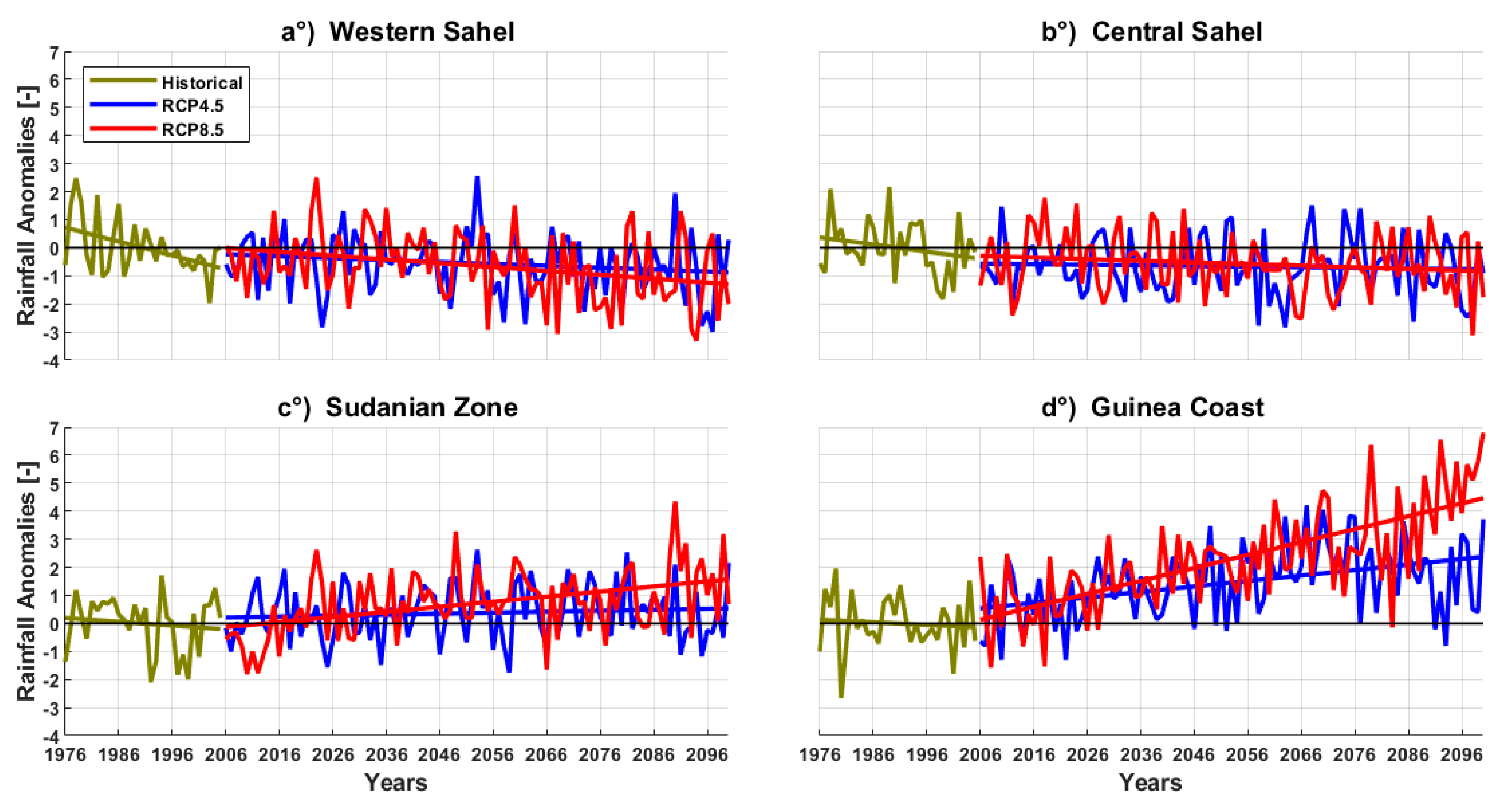
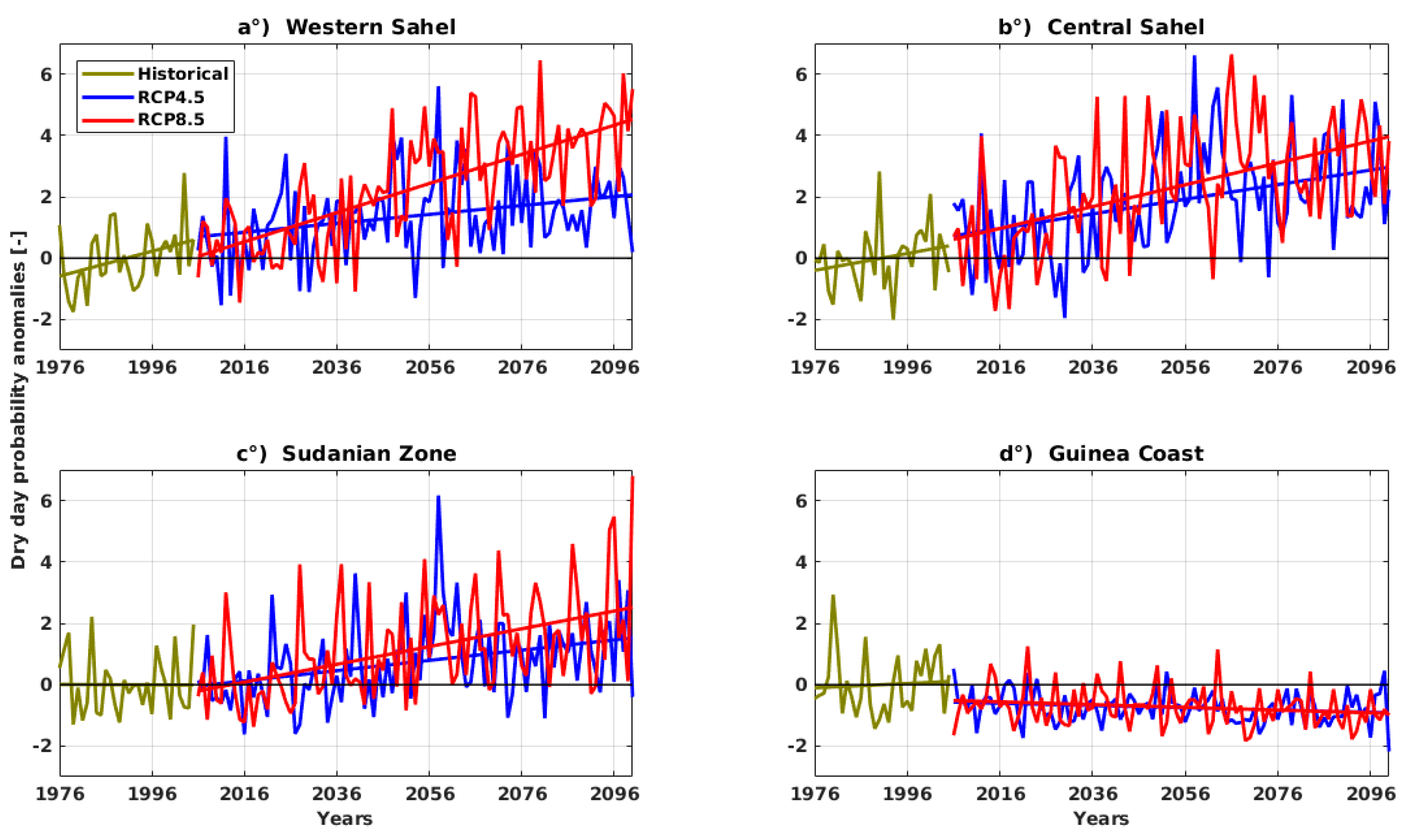
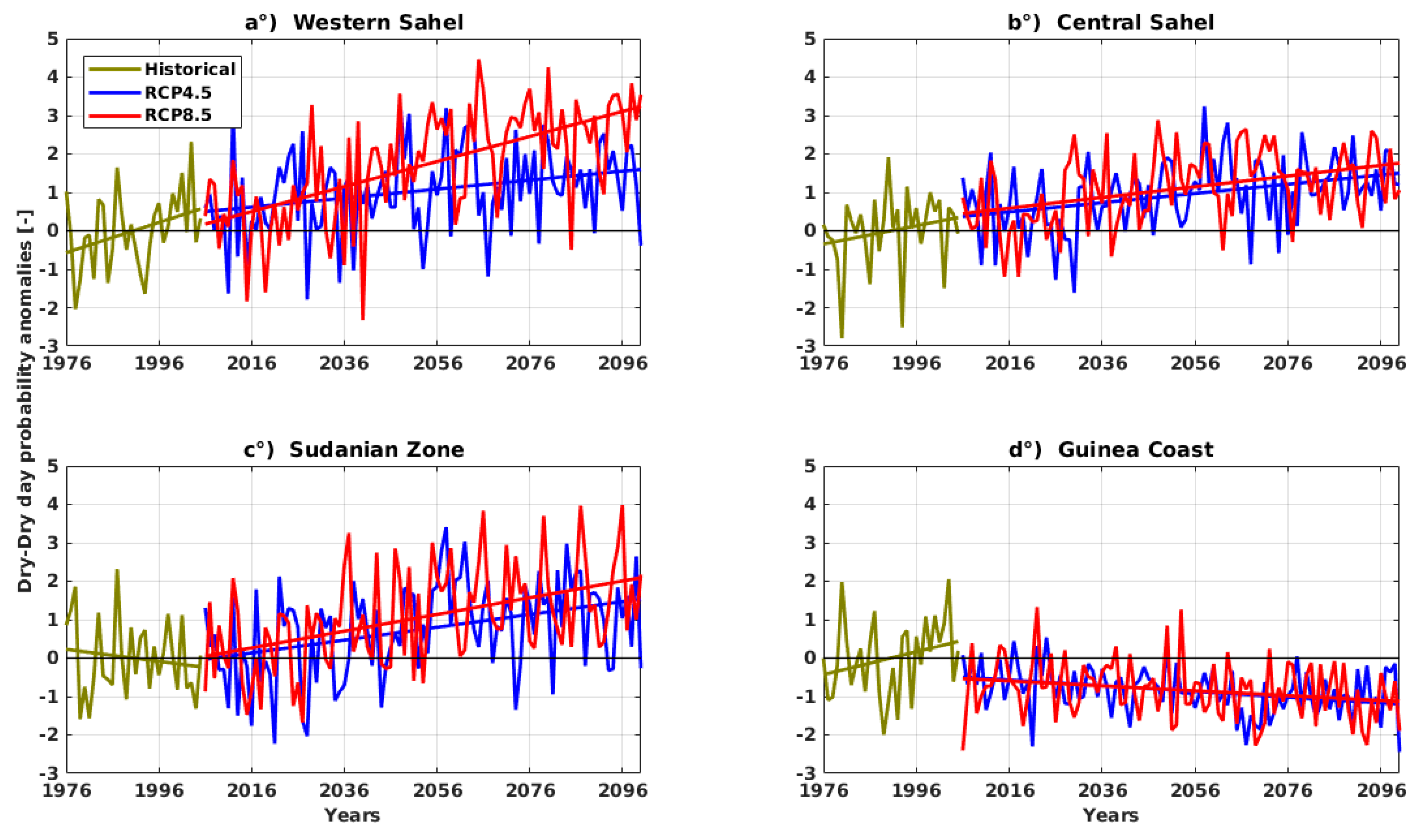
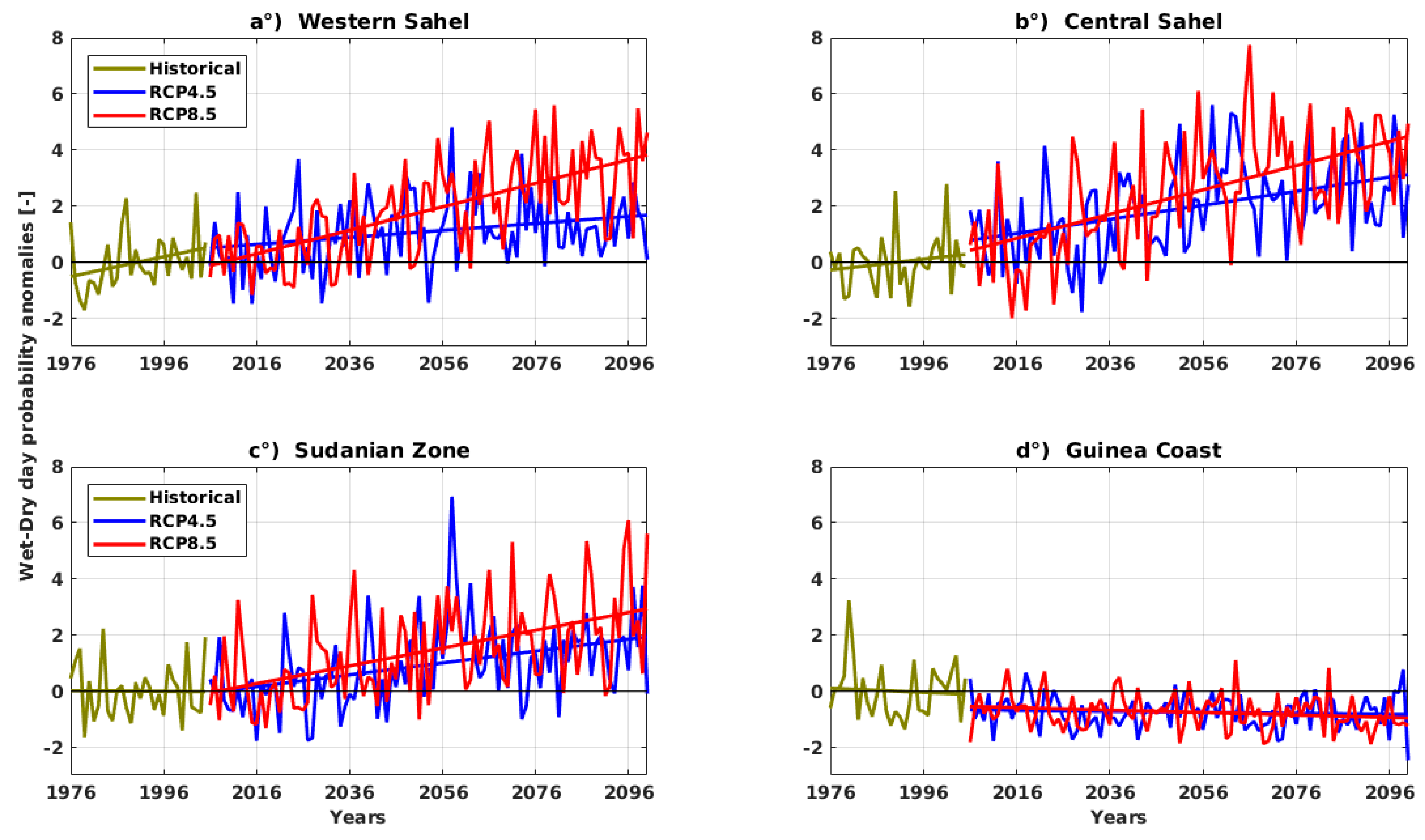
References
- Afouda A, Adisso P (1997). Etude stochastique des structures de séquences sèches au Bénin. Sustainability of Water Resources under Increasing Uncertainly (Proceedings of the Rabat Symposium S1) IAHS Publication 240 Rabat Maroc.
- Akinsanola AA, Zhou W (2020). Understanding the variability of West African summer monsoon rainfall: contrasting tropospheric features and monsoon index. Atmosphere 11:309. [CrossRef]
- Ayanlade A, Radeny M, Morton JF, Muchaba T (2018). Rainfall variability and drought characteristics in two agro-climatic zones: An assessment of climate change challenges in Africa. Science of the Total Environment 630:728-737.
- Barredo JI, Caudullo G, Mauri A (2017). Mediterranean habitat loss under RCP4.5 and RCP8.5 climate change projections. Assessing impacts on the Natura 2000 protected area network, EUR 28547 EN. [CrossRef]
- Basse J, Camara M, Diba I, Diedhiou A (2021). Probability of dry and wet spells over West Africa during the summer monsoon season - Scientific Research and Essays. 16(3): 20-35. Doi: 10.5897/SRE2021.6718. [CrossRef]
- Biao EI, Alamou EA (2018). Stochastic Modelling of Daily Rainfall for Decision Making in Water Management in Benin (West Africa). Research journal of Advance Environmental Science 1: 12-21.
- Bichet A, Diedhiou A (2018a). West African Sahel has become wetter during the last 30 years but dry spells are shorter and more frequent. Climate Research 75(2):155-162.
- Bichet A, Diedhiou A (2018b). Less frequent and more intense rainfall along the coast of the Gulf of Guinea in West and Central Africa (1981-2014). Climate Research 76(3):191-201.
- Coulibaly N, Coulibaly T, Mpakama Z, Savané I (2018). The impact of climate change on water resource availability in a trans-boundary basin in West Africa: the case of Sassandra. Hydrology 5, 12. [CrossRef]
- Diba I, Camara M, Sarr AB, Basse J, Sabaly HN, Diedhiou A (2021). Caractérisation des extrêmes composés de précipitation et de température au Sénégal: climat présent et futur -Afrique Science, 18(1): 12-30.
- Diba I, Camara M, Sarr AB (2016). Impacts of the Sahel-Sahara Interface Reforestation on West African Climate: Article ID 3262451, 20 Intraseasonal Variability and Extreme Precipitation Events. Advances in Meteorology, Volume 2016, pages.
- Didi SRM, Ly M, Kouadio K, Bichet A, Diedhiou A, Coulibaly HSJ, Kouadio KKA, Coulibaly TJH, Obahoundje S and Savané I (2020). Using the CHIRPS Dataset to Investigate Historical Changes in Precipitation Extremes in West Africa. Climate 8(7):1b-1b.
- Diedhiou A, Janicot S, Viltard A P de Felice (1998). Evidence of two regimes of easterly waves over West Africa and the tropical Atlantic. Geophysical Research Letters 25(15):2805-2808.
- Diedhiou A, Janicot S, Viltard A, De Felice P, Laurent H (1999). Easterly wave regimes and associated convection over West Africa and tropical Atlantic: results from the NCEP/NCAR and ECMWF reanalysis. Clim Dyn 15:795–822.
- Diedhiou A, Bichet A, Wartenburger R, Seneviratne SI, Rowell DP, Sylla MB, Diallo I, Todzo S, Touré NE, Camara M, Ngatchah BN, Kane NA, Tall L, Affholder F (2018). Changes in climate extremes over West and Central Africa at 1.5°C and 2°C global warming. Environ. Res. Lett. 13 (2018) 065020.
- Fall CMN, Lavaysse C, Kerdiles H, Dramé MS, Roudier P, Gaye AT (2021). Performance of dry and wet spells combined with far sensing indicators for crop yield prediction in Senegal Stern. Nat. Hazards Earth Syst. Sci., 21, 1051–1069, 2021. [CrossRef]
- FAO (2009). FAOSTAT online statistical service. Food and Agriculture Organization of the United Nations (FAO), Rome, Italy.
- Froidurot S, Diedhiou A (2017). Characteristics of wet and dry spells in the West African monsoon system. Atmospheric Science Letters 18(3):125-131.
- GIEC (2013) Climate Change 2013. The Physical Science Basis. Contribution of Working Group I to the Fifth Assessment Report (AR5) of the Intergovernmental Panel on Climate Change. Chapter 9: Evaluation of Climate Models - Final Draft Underlying Scientific-Technical Assessment. [G. Flato, J. Marotzke, B. Abiodun, P. Braconnot, S. Chan Chou,W.Collins, P.Cox, F. Driouech, S. Emori, V. Eyring, C. Forest, P. Gleckler, E. Guilyardi, C. Jakob, V. Kattsov, C. Reason, M.Rummukainen], 207 p.
- Giorgi F, Jones C, Asrar GR (2009). Addressing climate information needs at the regional level: The CORDEX framework. WMO Bull., 58, 175-183.
- Hewitson BC, Lennard C, Nikulin G, Jones C (2012). CORDEX-Africa: a unique opportunity for science and capacity building. CLIVAR Exchanges, 17(3), 6-7.
- Jones CG, Giorgi F, Asrar G (2011). The Coordinated Regional Downscaling Experiment (CORDEX); An international downscaling link to CMIP5. CLIVAR Exchanges, International CLIVAR Project Office, No. 56, Southampton, United Kingdom, 34-40.
- Klein Tank AMG, Zwiers FW, Zhang X (2009). Guidelines on analysis of extremes in a changing climate in support of informed decisions for adaptation. Climate data and monitoring WCDMP-No. 72, WMO-TD No. 1500, pp. 56.
- Koffi B, Brou AL, Kouadio KJO, Ebodé VB, N’guessan KJY, Yangouliba GI, Yaya K, Brou D, Kouassi KL (2023). Impact of climate and land use/land cover change on Lobo reservoir inflow, West-Central of Côte d’Ivoire. Journal of Hydrology: Regional Studies 47 (2023) 101417. https://orcid.org/0000-0002-4835-2975.
- Kouadio KY, Ochou DA, Servain J (2003). Tropical Atlantic and rainfall variability in Côte d’Ivoire. Geophysical Research Letters, 30:1-15.
- Kouadio KCA, Amoussou E, Coulibaly TJH, Diedhiou A, Coulibaly HSJ-P, Didi R, Savané I (2020). Analysis of hydrological dynamics and hydropower generation in a West African anthropized watershed in a context of climate change. Model. Earth Syst. Environ. 6, 2197–2214. [CrossRef]
- Kulkarni A, Deshpande N, Kothawale DR, Sabade SS, Ramarao MVS, Sabin TP, Patwardhan S, Mujumdar M, Krishnan R (2017). Observed climate variability and change over India. In: Krishnan R, Sanjay J (eds) Climate change over India-an interim report.
- Lawin AE, Hounguè R, N’Tcha M’Po Y, Hounguè NR, Attogouinon A, Afouda AA (2019). Mid-century climate change impacts on Ouémé River discharge at bonou outlet (Benin). Hydrology 6, 72. [CrossRef]
- Mbaye ML Sylla MB, Tall M (2019). Impacts of 1.5 and 2.0 °C Global Warming on Water Balance Components over Senegal in West Africa. Atmosphere, 10, 712. [CrossRef]
- Moon SE, Ryoo SB, Kwon JG (1994). A markov chain model for daily precipitation occurrence in South Korea. International Journal of Climatology 14(9):1009-1016. Doi: 551.577.2 (519.5):519.217.
- Nikulin G, Jones C, Giorgi F, Asrar G, Büchner M, Cerezo-Mota R, Christensen OB, Déqué M, Fernandez J, Hänsler A, van Meijgaard E, Samuelsson P, Sylla MB, Sushama L (2012). Precipitation climatology in an ensemble of CORDEX-Africa regional climate simulations. J Clim, 25:6057–6078.
- Nkrumah F, Vischel T, Panthou G, Klutse NAB, Adukpo DC, Diedhiou A (2019). Recent Trends in the Daily Rainfall Regime in Southern West Africa. Atmosphere; 10(12):741. [CrossRef]
- Nuga OA, Adekola LO (2018). A Markov chain analysis of rainfall distributions in three south western cities of Nigeria. Research Journal of Physical Sciences 6(4): 1-5.
- Ogega OM, Gyampoh BA, Mistry MN (2020). Intraseasonal Precipitation Variability over West Africa under 1.5 °C and 2.0 °C Global Warming Scenarios: Results from CORDEX RCMs. Climate 2020, 8(12), 143. [CrossRef]
- Ouédraogo PLA, Zorom M, Niang D, Fossi S (2013). Prédétermination des séquences sèches et intérêt de l'information climatique sur la production céréalière en zone sahélienne. Institut International d'Ingénierie, Ouagadougou, BF, mémoire master en ingénierie, 61 pages.
- Pandarinath N (1991). Markov chain model probability of dry and wet weeks during monsoon periods over Andhra Pradesh, Mausam, 42, 4, 393-400.
- Raheem MA, Yahya WB, Obisesan KO (2015). A Markov chain approach on pattern of rainfall distribution. Journal of Environmental Statistics 7(1):1-13.
- Raheem MA, Ezepue PO (2016). A Three-State Markov Model for Predicting Movements of Asset Returns of a Nigerian Bank. CBN Journal of Applied Statistics 7(2):77-99.
- Ray M, Biswasi, Sahoo, Patro H (2018). A Markov Chain Approach for Wet and Dry Spell and Probability Analysis. International Journal of Current Microbiology and Applied Sciences, Special Issue-6: 1005-1013.
- Rockström J, Barron J, Fox P (2002). Rainwater management for increased productivity among small-holder farmers in drought prone environments. Physics and Chemistry of the Earth, Volume 27, Issues 11-22, Pages 949-959. [CrossRef]
- Salack S, Klein C, Giannini A, Sarr B, Worou ON, Belko N, Bliefer-nicht J, Kunstman H (2016). Global warming induced hybrid rainyseasons in the Sahel.Environmental Research Letters: ERL11:104008.
- Sarr AB, Camara M, Diba I (2018) Multi-model Analysis of the West African Monsoon: Seasonal Evolution and the Monsoon Onset. Journal of Scientific Research & Reports, 20(2): 1-17.
- Sarr AB, Camara M (2017) Evolution des indices pluviométriques extrêmes par l’analyse de modèles climatiques régionaux du programme CORDEX : Les projections climatiques sur le Sénégal. European Scientific Journal. Vol.13, No.17 ISSN: 1857-7881 (print)e - ISSN 1857- 7431. [CrossRef]
- Sen Z (2015) Regional Wet and Dry spell analysis with heterogeneous probability occurrences. Journal of Hydrologic Engineering 20.
- Sonnadara DUJ, Jayewardene DR (2015). A Markov chain probability model to describe wet and dry patterns of weather at Colombo. Theoretical and Applied Climatology 119(1):333-340. [CrossRef]
- Stern RD, Cooper PMJ (2011). Assessing climate risk and climate change using rainfall data: a case study from Zambia. Experimental Agriculture 47(2):241-266.
- Sylla MB, Giorgi F, Pal JS, Gibba P, Kebe I, Nikiema M (2015) Projected changes in the annual cycle of high intensity precipitation events over West Africa for the late 21st century. Journal of Climate, 28, 6475-6488. [CrossRef]
- Ta S, Kouadio KY, Ali KE, Toualy E, Aman A, Yoroba F (2016) West Africa Extreme Rainfall Events and Large-Scale Ocean Surface and Atmospheric Conditions in the Tropical Atlantic Advances in Meteorology, vol. 2016, Article ID 1940456, 14 pages. [CrossRef]
- Todzo S, Bichet A, Diedhiou A (2020) Intensification of the hydrological cycle expected in West Africa over the 21st century. Earth Syst Dyn 11:319-328. [CrossRef]
- Tschakert P, Sagoe R, Ofori-Darko G, Codjoe SN (2010) Floods in the Sahel: an analysis of Anomalies, memory, and anticipatory learning. Climatic Change 103, 471-502. [CrossRef]
- Wu MLC, Reale O, Schubert SD (2013) A characterization of African easterly waves on 2.5-6 day and 6-9 day time scales. Journal of Climate 26(18):6750-6774.
- Yapo ALM, Diawara A, Kouassi BK, Yoroba F, Sylla MB, Kouadio K, Tiémoko DT, Koné DI, Akobé EY, Yao KPAT (2020) Projected changes in extreme precipitation intensity and dry spell length in Côte d’Ivoire under future climates. [CrossRef]
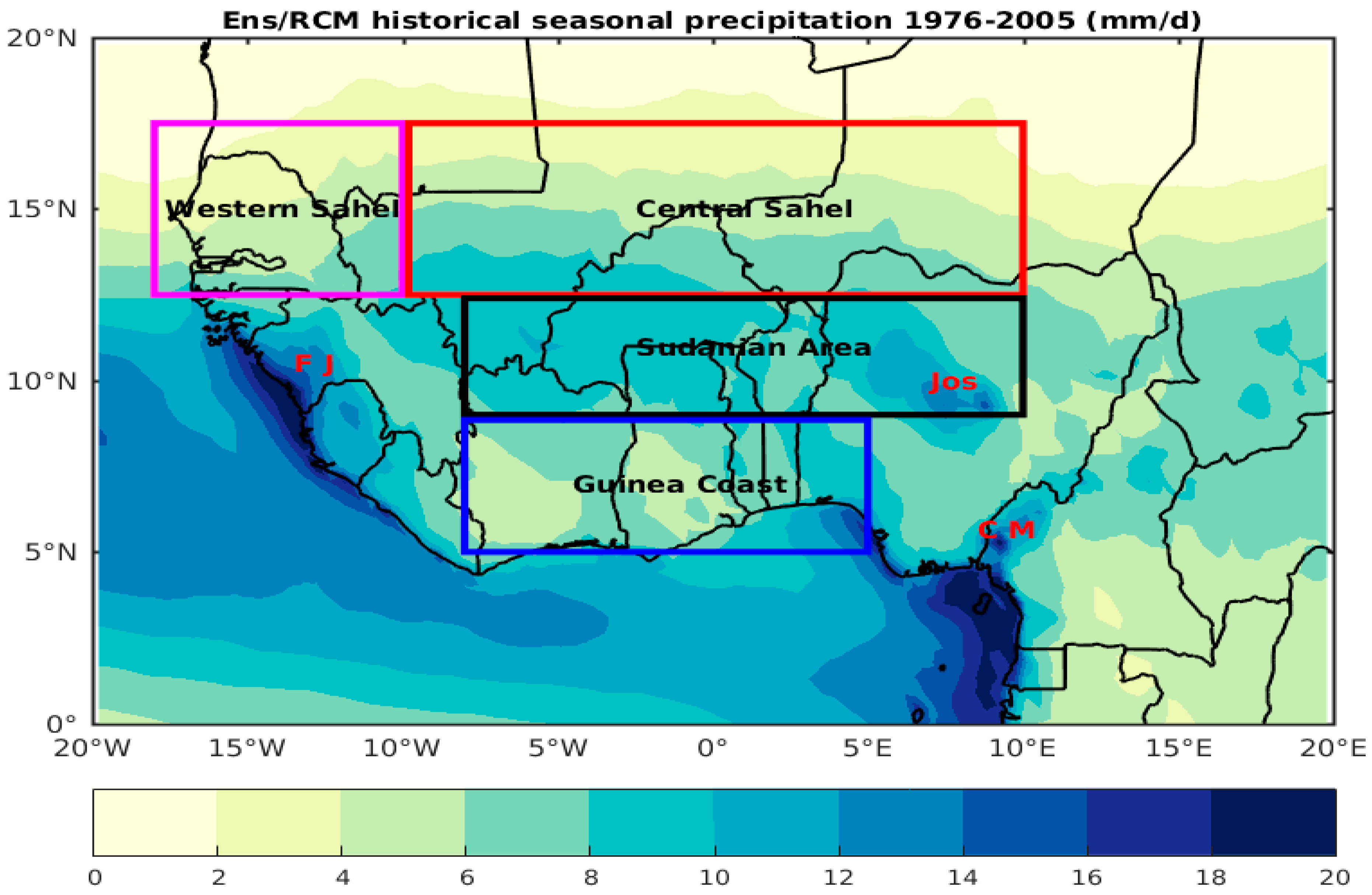
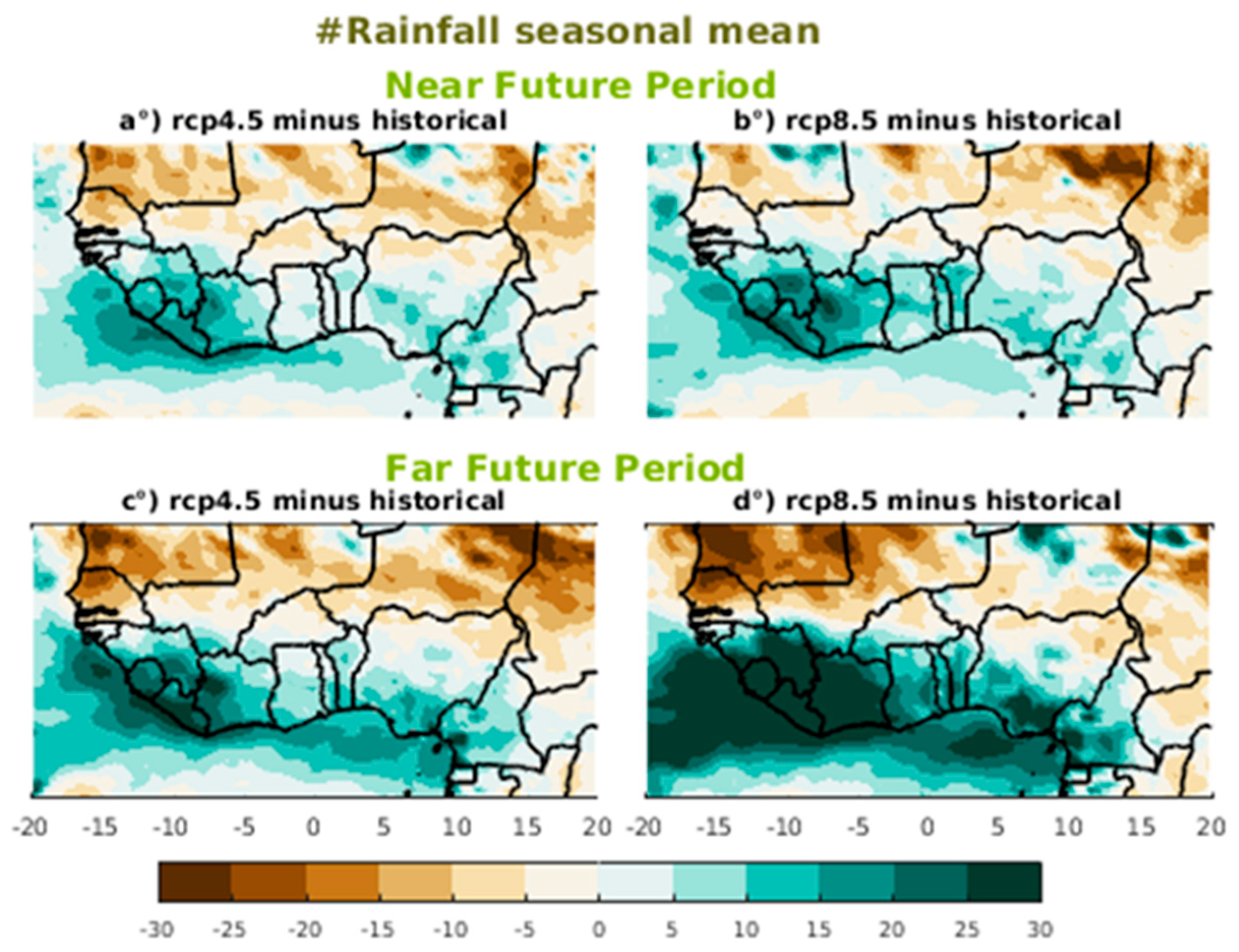
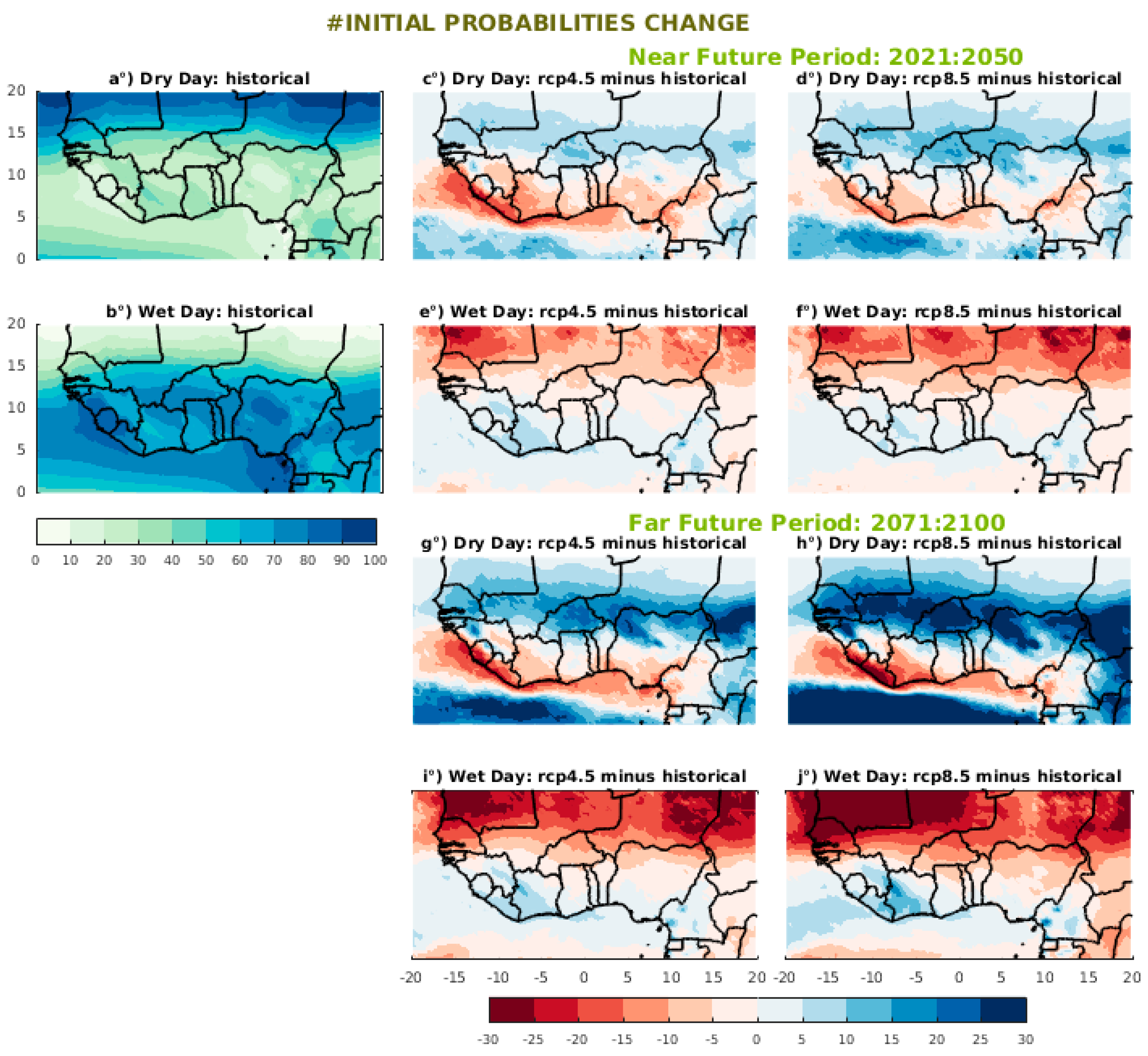
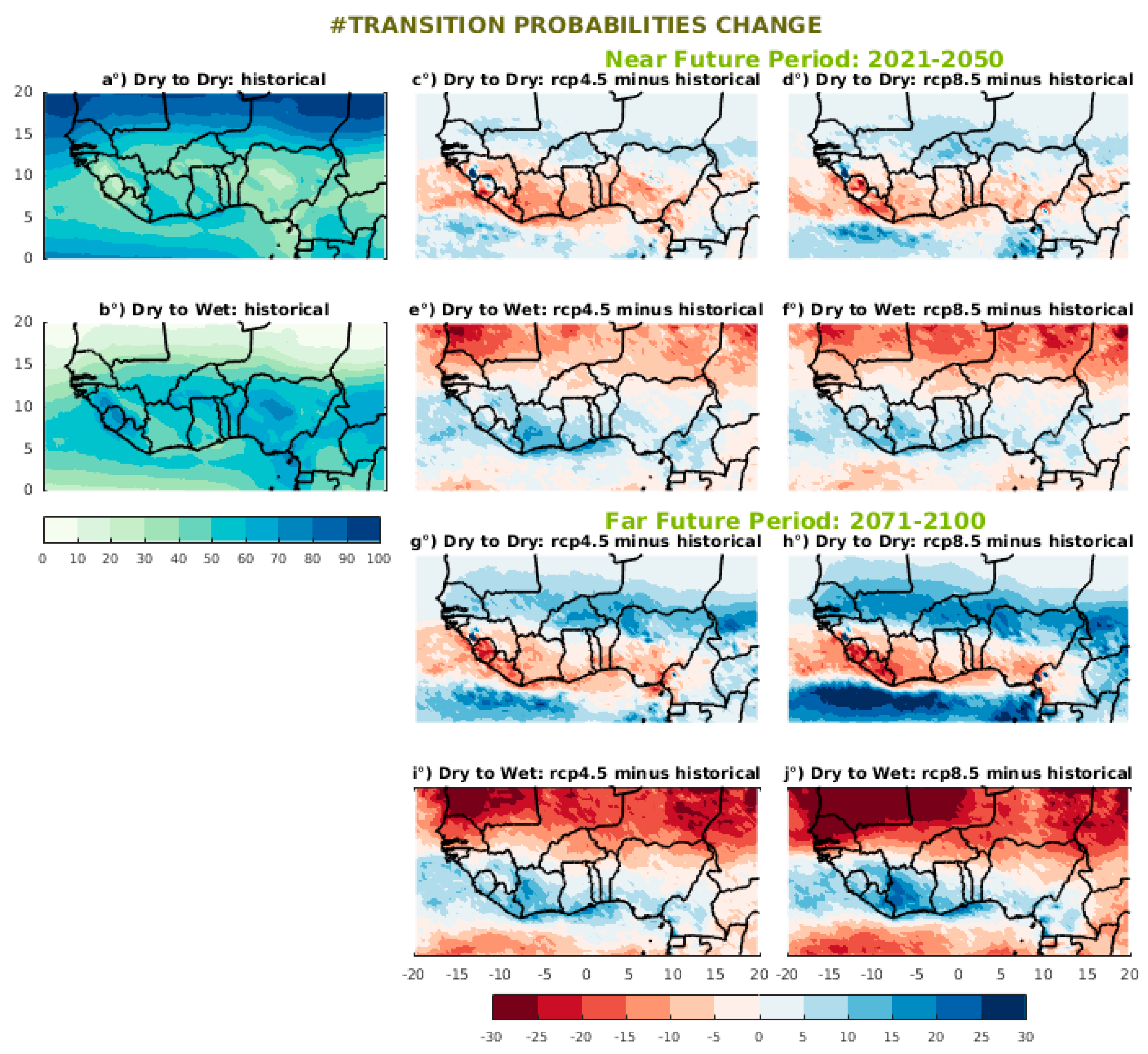
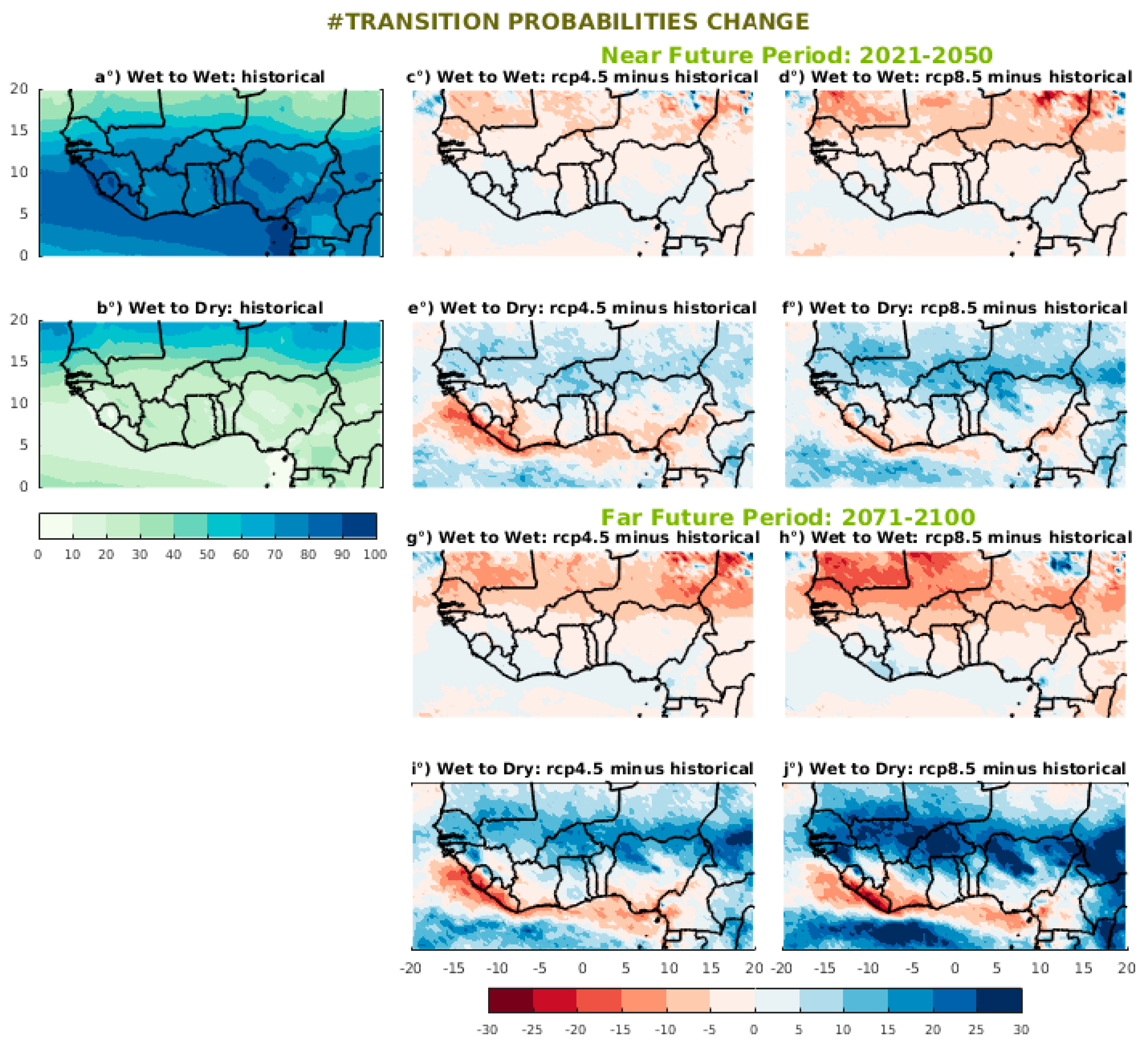
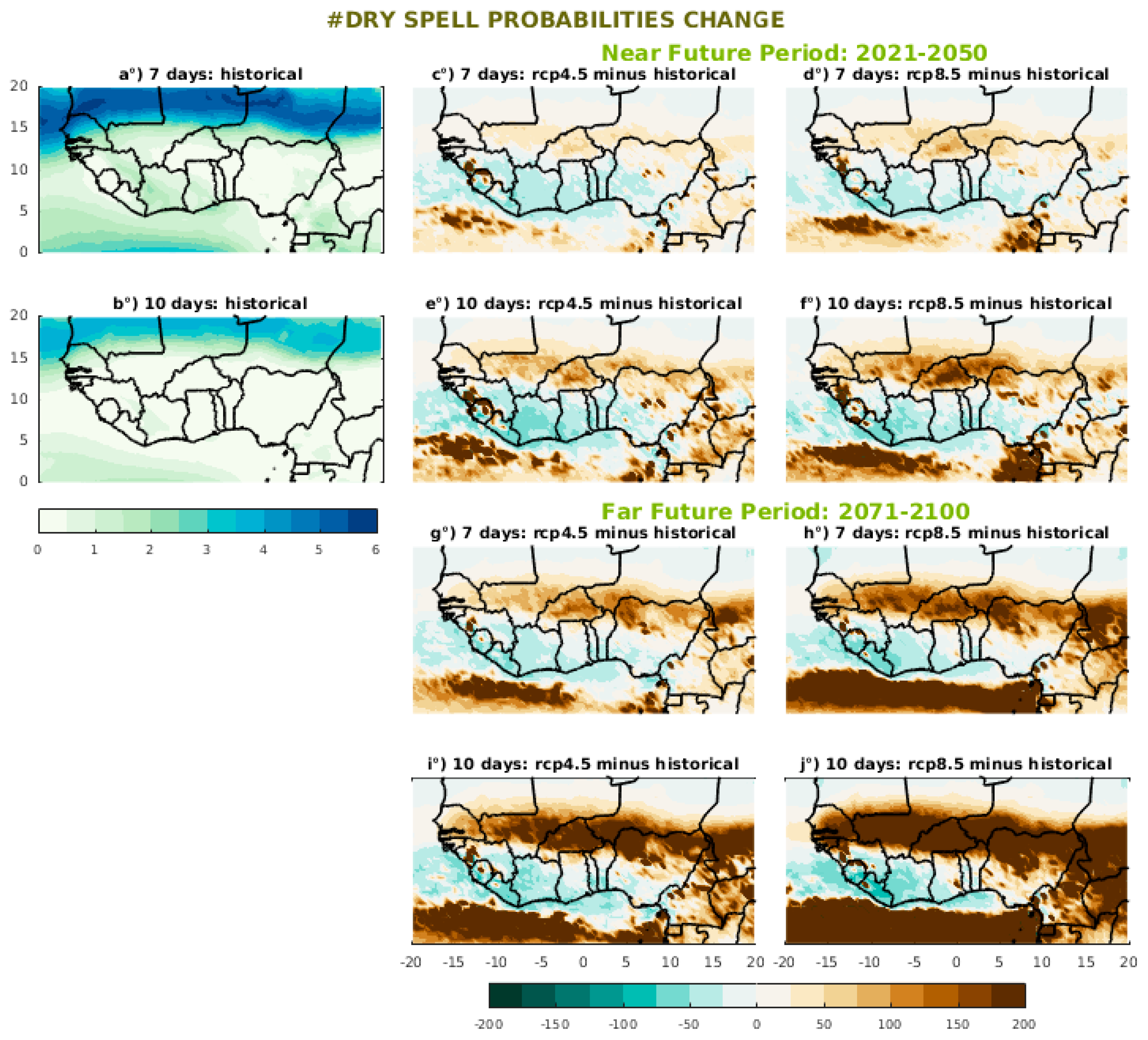
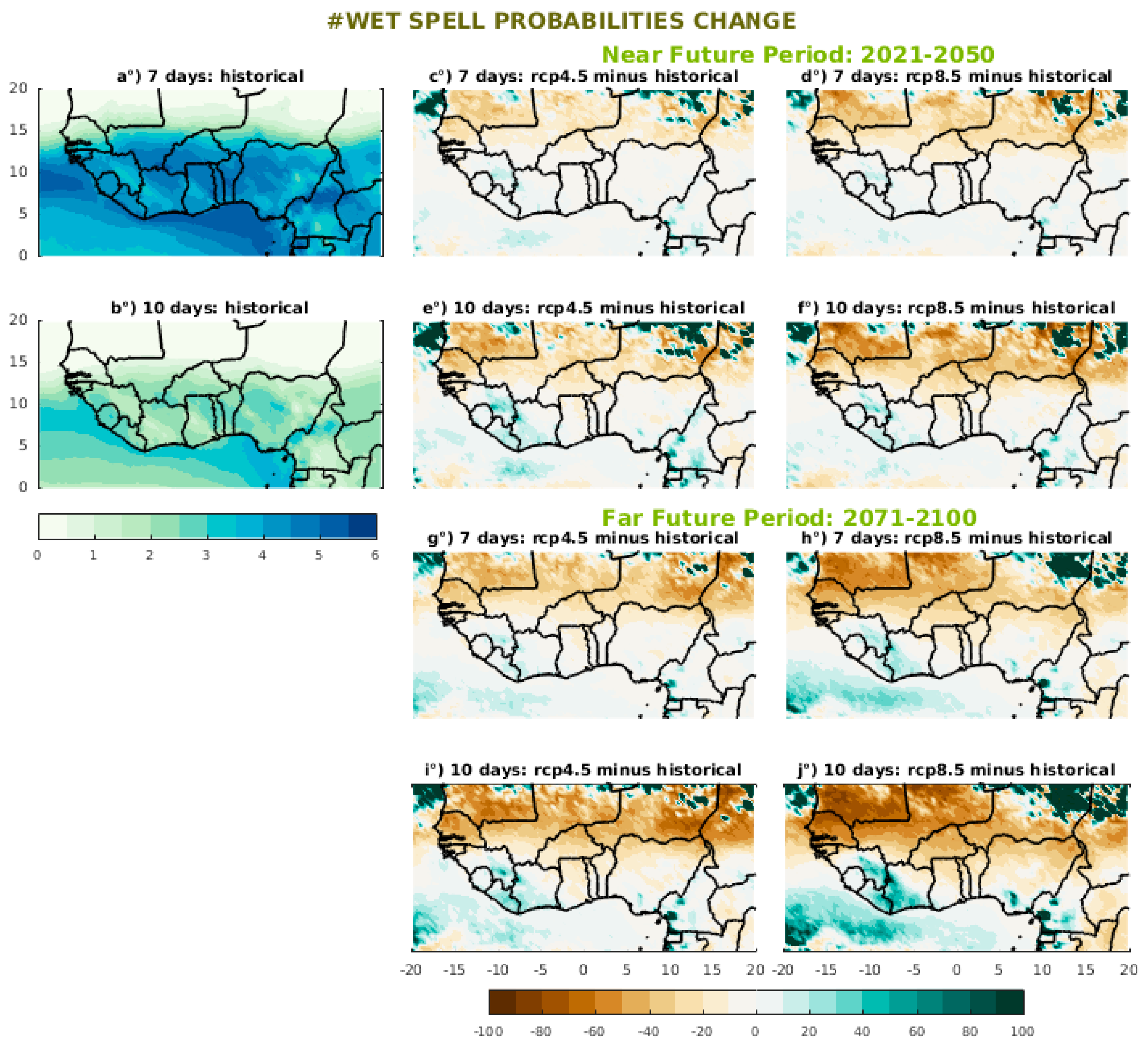
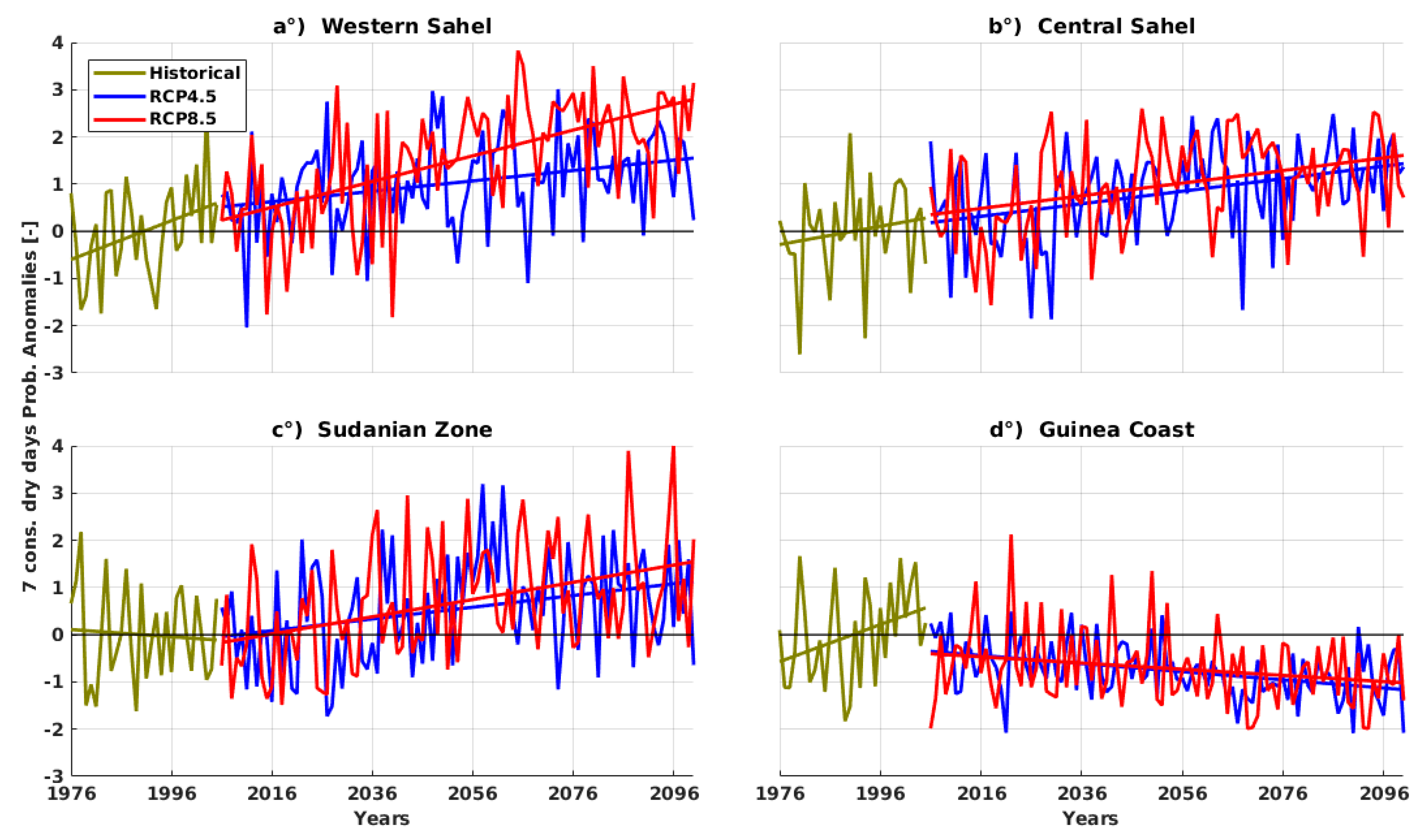
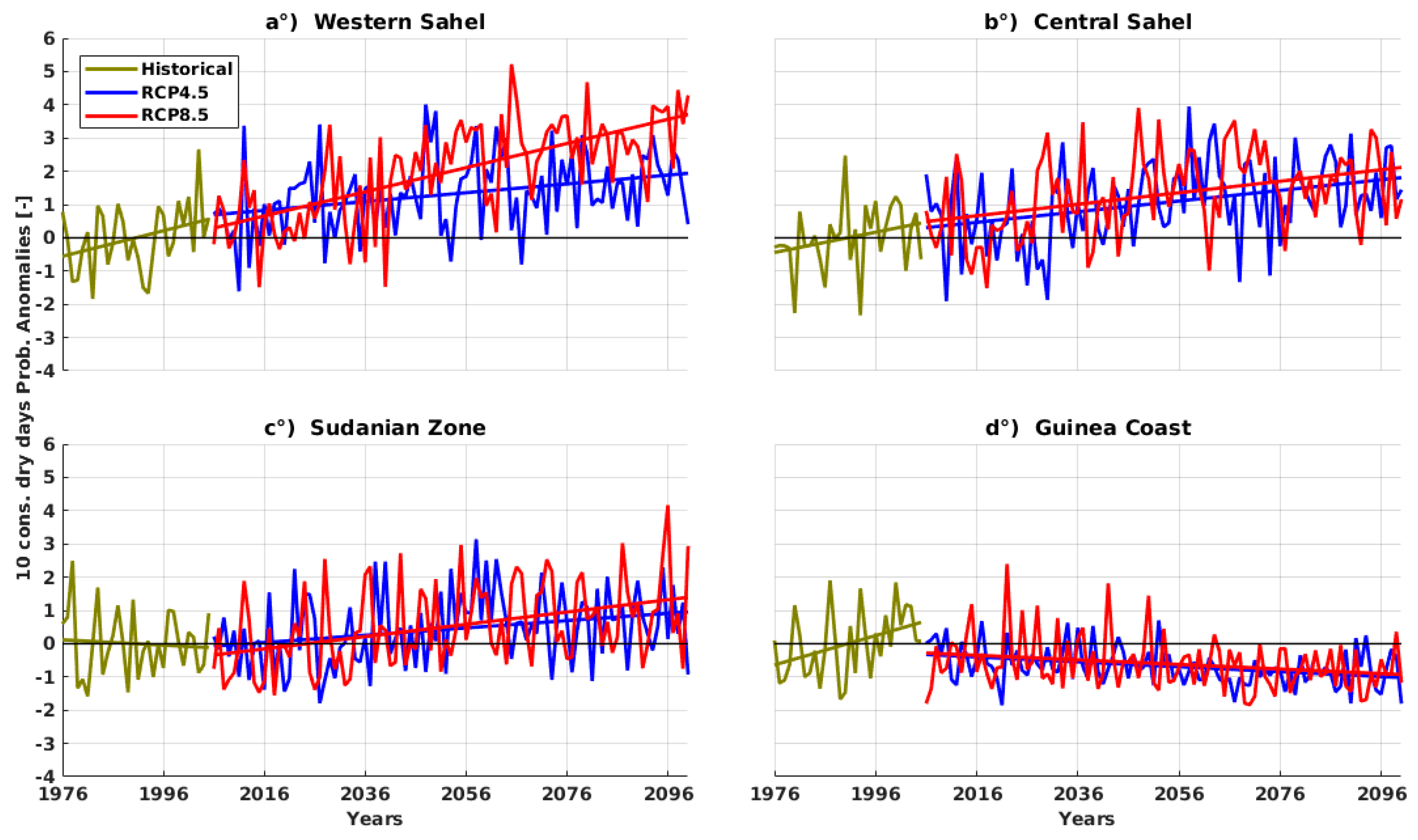
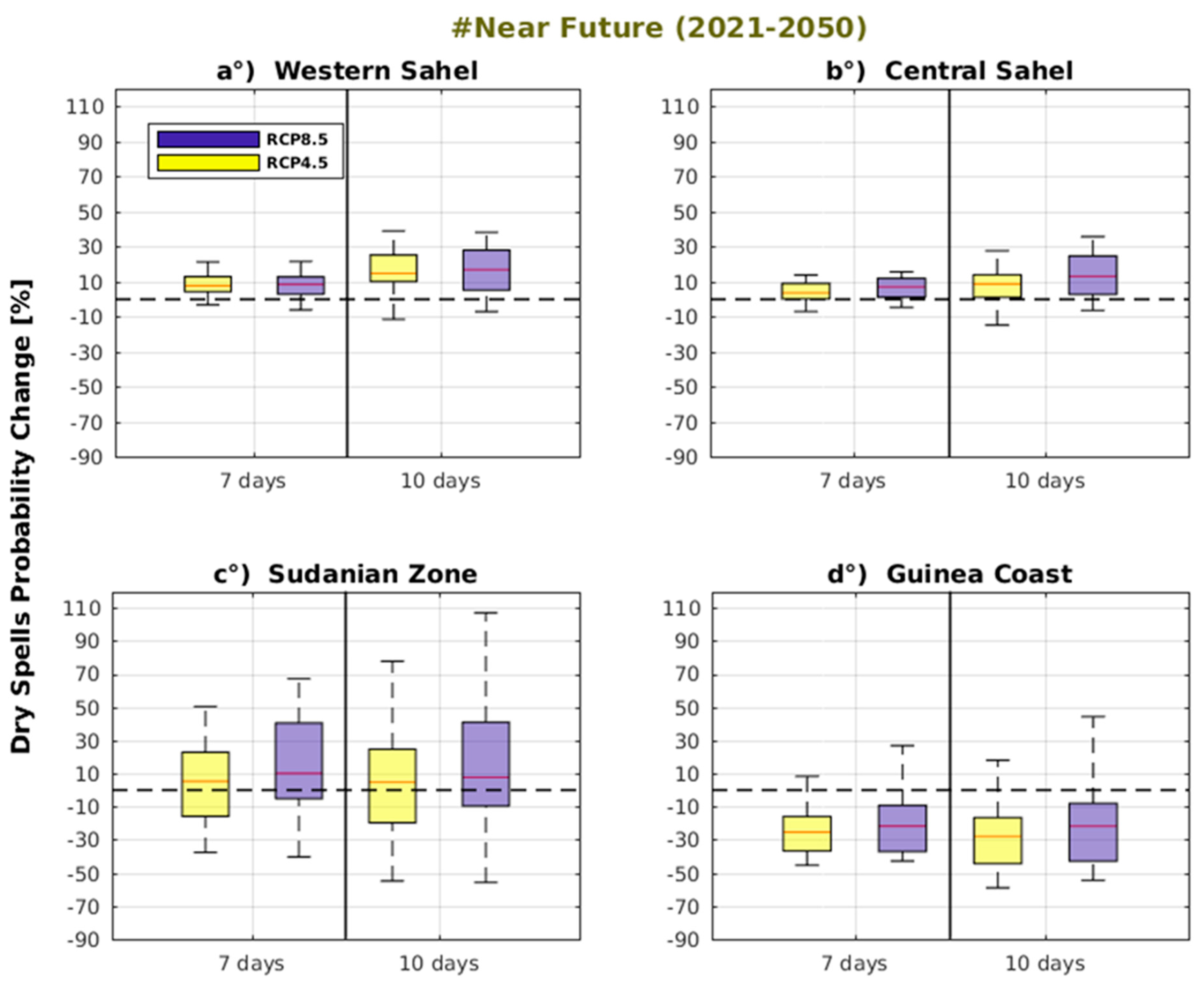
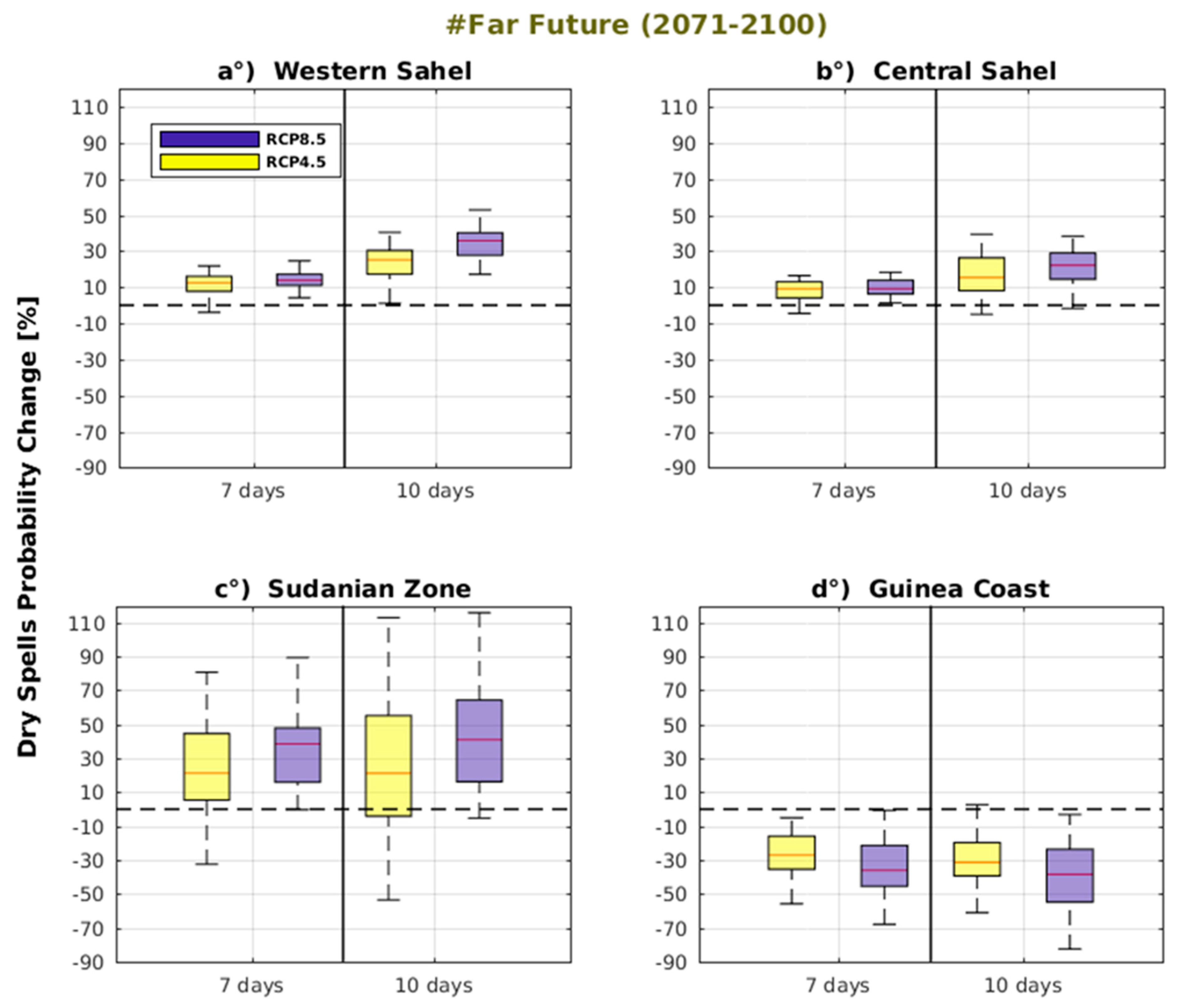
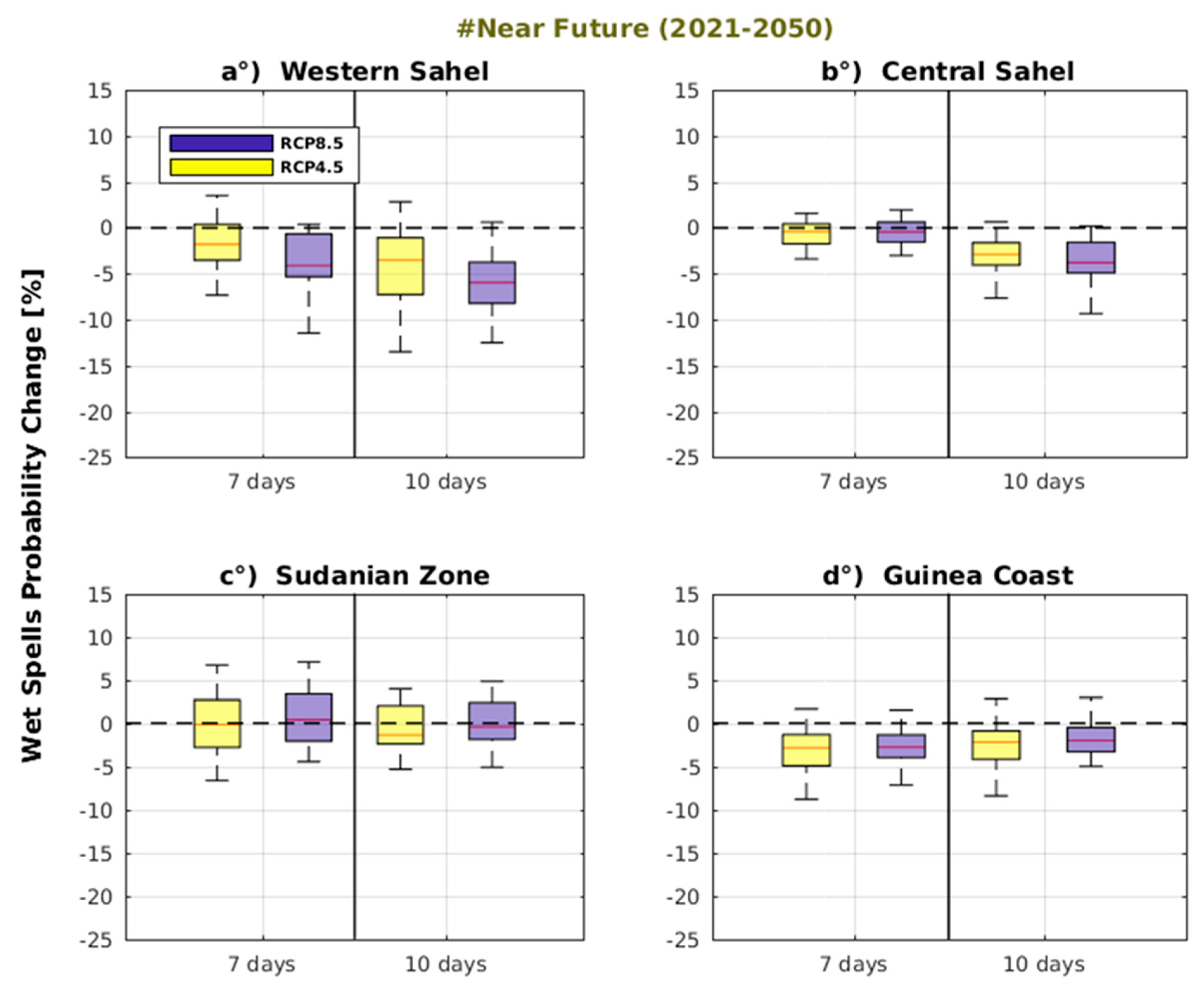
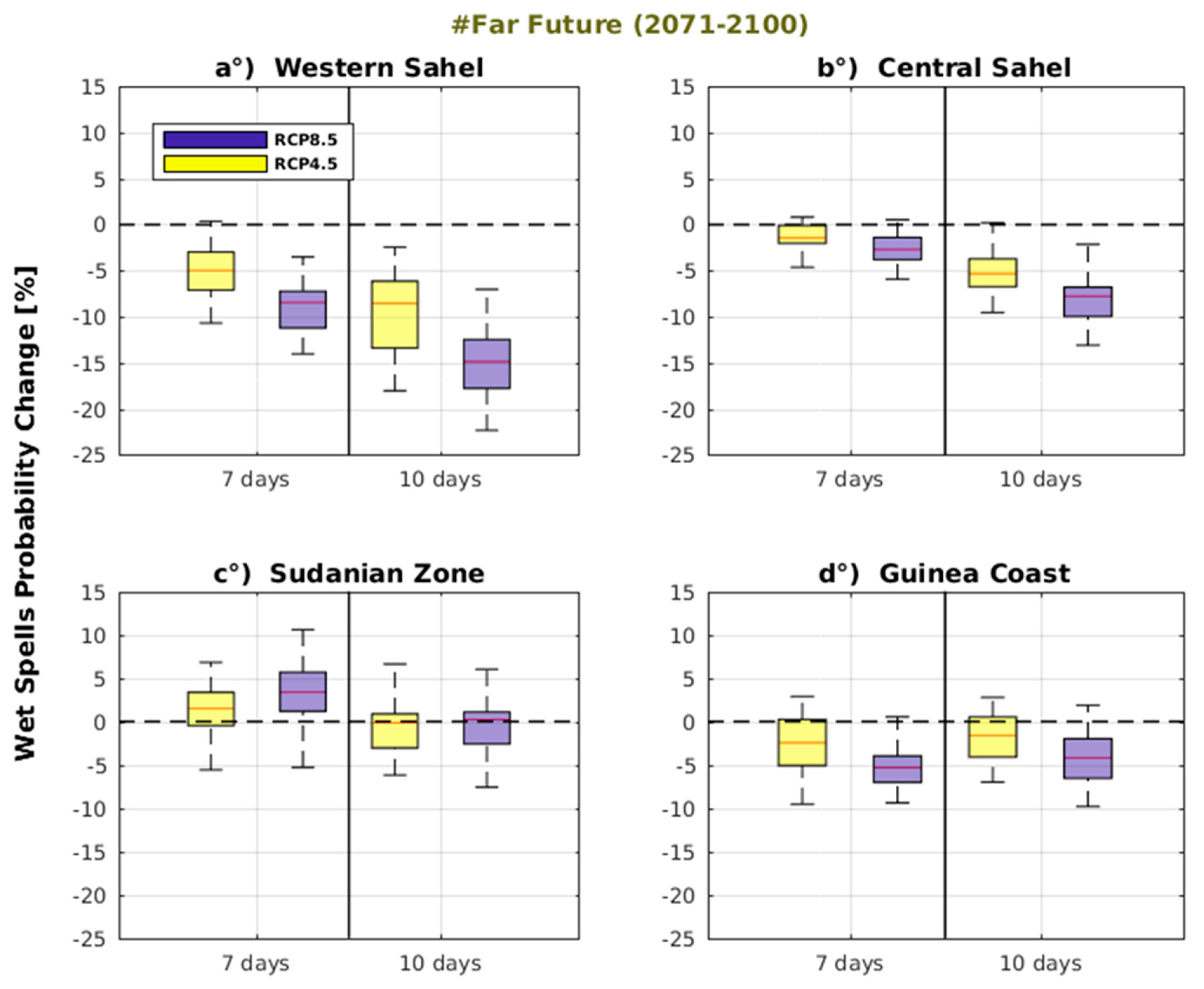
| Driving GCM |
Institute |
RCM |
Historical Period |
Projection Period |
|---|---|---|---|---|
| MPI | REMO | 1976-2005 | 2021-2050 ; 2071-2100 | |
| ICHEC-EC-EARTH | KNMI | RACMO22T | 1976-2005 | 2021-2050 ; 2071-2100 |
| DMI | HIRHAM5 | 1976-2005 | 2021-2050 ; 2071-2100 | |
| CNRM-CERFACS | CLMcom | CCLM4-8-17 | 1976-2005 | 2021-2050 ; 2071-2100 |
| Periods | 2021-2050 | 2071-2100 | ||
|---|---|---|---|---|
| Scenarios | RCP4.5 | RCP8.5 | RCP4.5 | RCP8.5 |
| Rainfall | ||||
| Western Sahel | -5.71 | -1.44 | -10.04 | -13.22 |
| Central Sahel | -6.04 | -3.00 | -7.46 | -6.55 |
| Sudanian Area | 1.71 | 5.67 | 3.13 | 8.28 |
| Guinea Coast | 7.51 | 10.94 | 12.58 | 26.07 |
| 7-day dry-spell probabilities | ||||
| Western Sahel | 11.63 | 15.55 | 25.90 | 47.17 |
| Central Sahel | 24.40 | 34.52 | 56.65 | 82.35 |
| Sudanian Area | 2.66 | 15.52 | 49.77 | 81.23 |
| Guinea Coast | -33.33 | -27.18 | -27.42 | -25.61 |
| 10-day dry-spell probabilities | ||||
| Western Sahel | 27.24 | 34.73 | 60.61 | 126.53 |
| Central Sahel | 51.18 | 76.91 | 133.91 | 223.04 |
| Sudanian Area | 19.75 | 43.71 | 120.10 | 215.20 |
| Guinea Coast | -40.93 | -35.03 | -34.10 | -20.60 |
| 7-day wet-spell probabilities | ||||
| Western Sahel | -14.64 | -23.23 | -29.33 | -43.75 |
| Central Sahel | -14.54 | -24.01 | -28.36 | -35.51 |
| Sudanian Area | -3.41 | -5.92 | -8.22 | -13.77 |
| Guinea Coast | 0.37 | -0.25 | -0.15 | 1.43 |
| 10-day wet-spell probabilities | ||||
| Western Sahel | -17.90 | -31.50 | -40.49 | -57.68 |
| Central Sahel | -20.54 | -34.68 | -41.31 | -47.22 |
| Sudanian Area | -6.07 | -11.01 | -15.33 | -24.53 |
| Guinea Coast | 3.16 | 0.71 | 1.94 | 6.38 |
Disclaimer/Publisher’s Note: The statements, opinions and data contained in all publications are solely those of the individual author(s) and contributor(s) and not of MDPI and/or the editor(s). MDPI and/or the editor(s) disclaim responsibility for any injury to people or property resulting from any ideas, methods, instructions or products referred to in the content. |
© 2024 by the authors. Licensee MDPI, Basel, Switzerland. This article is an open access article distributed under the terms and conditions of the Creative Commons Attribution (CC BY) license (http://creativecommons.org/licenses/by/4.0/).





